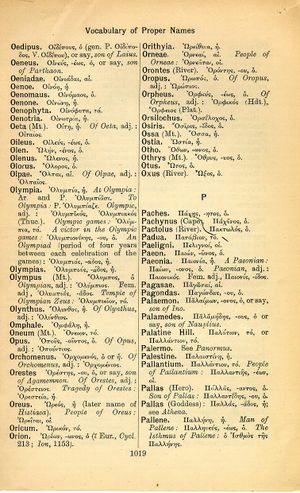Otho: Difference between revisions
τίς τὸν πλανήτην Οἰδίπουν καθ' ἡμέραν τὴν νῦν σπανιστοῖς δέξεται δωρήμασιν → who on this day shall receive Oedipus the wanderer with scanty gifts
(3) |
m (Text replacement - "(|thumb)\n(\|link=)" to "$1$2") |
||
| Line 1: | Line 1: | ||
{{WoodhouseENELnames | {{WoodhouseENELnames | ||
|Text=[[File:woodhouse_1019.jpg|thumb | |Text=[[File:woodhouse_1019.jpg|thumb|link={{filepath:woodhouse_1019.jpg}}]]Ὄθων, -ωνος, ὁ. | ||
|link={{filepath:woodhouse_1019.jpg}}]]Ὄθων, -ωνος, ὁ. | |||
}} | }} | ||
{{Lewis | {{Lewis | ||
Revision as of 16:54, 18 May 2020
English > Greek (Woodhouse)
Ὄθων, -ωνος, ὁ.
Latin > English (Lewis & Short)
Ŏtho: ōnis, m., = Ὄθων,
I a Roman surname.
I L. Roscius Otho, a knight, a friend of Cicero, and author of the law that the knights should occupy the first fourteen seats in the theatre next to the orchestra, Cic. Mur. 19, 40; cf. Ascon. ad Cornel. p. 79 Orell.—Hence, sic libitum vano, qui nos distinxit, Othoni, Juv. 3, 159.—
II M. Salvius Otho, a Roman emperor, whose biography is given by Suetonius: mollis Otho, Mart. 6, 32, 2; Juv. 2, 99.—Hence,
B Ŏthōnĭānus, a, um, adj., of or belonging to the emperor Otho, Othonian: Othoniani duces, of the emperor Otho, Tac. H. 2, 24: partes, id. ib. 2, 33.
Latin > French (Gaffiot 2016)
Ŏthō,⁸ ōnis, m. (Ὄθων), surnom romain ; nott : L. Roscius Othon [tribun de la plèbe, qui fixa la place des chevaliers au théâtre] : Cic. Mur. 40 || M. Salvius Othon [qui détrôna Galba et fut vaincu par Vitellius : Mart. 6, 32, 2 ; Juv. 2, 99 || -nĭānus, a, um, d’Othon : Tac. H. 2, 24 || subst. m. pl., les soldats d’Othon : Tac. H. 1, 34.
Latin > German (Georges)
Otho, ōnis, m. (Ὄθων), ein röm. Beiname, unter dem bes. bekannt sind 1) L. Roscius Otho, Volkstribun 68 v. Chr., Urheber der lex, daß die Ritter besondere Sitze im Theater haben sollten, Cic. Mur. 40. – 2) M. Salvius Otho, ein röm. Kaiser, Suet. Oth. 1. – Dav. Othōniānus, a, um, othonianisch, partes, duces, des Kaisers Otho, Tac.
Latin > English
Otho Othonis N M :: Otho (Silvius Otho, Emperor, 69 AD, year of the 4 Emperors); Roman cognomen

